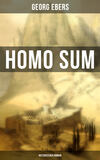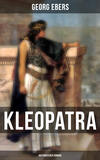Kitabı oku: «The Bride of the Nile. Complete», sayfa 38
“If only he were by our side!” sighed the widow. At this the little girl snatched away her hand, made her way with the nimbleness of a squirrel through the mass of men, and soon had reached the Masdakite. Rustem had not yet quitted Memphis, for the first caravan, which he and his little wife were to join, was not to start for a few days. The worthy Persian and Mary were very good friends; as soon as he heard that his benefactress was alarmed he pushed his way to her, with the child, and the widow breathed more freely when he offered to remain near her and protect her.
Meanwhile the yelling and shouting were louder than ever. Every face, every eye was turned to the Curia, in the evident expectation of something great and strange taking place there.
“What is it?” asked Mary, pulling at Rustem’s coat. The giant said nothing, but he stooped, and to her delight, a moment later she had her feet on his arms, which he folded across his chest, and was settling herself on his broad shoulder whence she could survey men and things as from a tower. Joanna laid her hand in some tremor on the child’s little feet, but Mary called down to her: “Mother—Pulcheria—I am quite sure our old Horapollo’s white ass is standing in front of the Curia, and they are putting a garland round the beast’s neck—a garland of olive.”
At this moment the blare of a tuba rang out from the Senate-house across the square, through the suffocatingly hot, quivering air; a sudden silence fell and spread till, when a man opened his mouth to shout or to speak, a neighbor gave him a shove and bid him hold his tongue. At this the widow held Mary’s ankles more tightly, asking, while she wiped the drops from her brow:
“What is going on?” and the child answered quickly, never taking her eyes off the scene:
“Look, look up at the balcony of the Curia; there stands the chief of the Senate—Alexander the dyer of purple—he often used to come to see my grandfather, and grandmother could not bear his wife. And by his side—do you not see who the man is close by him?
“It is old Horapollo. He is taking the laurel-crown off his wig!—Alexander is going to speak.”
She was interrupted by another trumpet call, and immediately after a loud, manly voice was heard from the Curia, while the silence was so profound that even the widow and her daughter lost very little of the speech which followed:
“Fellow-citizens, Memphites, and comrades in misfortune,” the president began in slow, ringing tones, “you know what the sufferings are which we all share. There is not a woe that has not befallen us, and even worse loom before us.”
The crowd expressed their agreement by a fearful outcry, but they were reduced to silence by the sound of the tuba, and the speaker went on:
“We, the Senate, the fathers of the city, whom you have entrusted with the care of your persons and your welfare…”
At this point he was interrupted by wild yells, and cries could be distinguished of: “Then take care of us—do your duty!”
“Money bags!”
“Keep your pledge!”
“Save us from destruction!”
The trumpet call, however, again silenced them, and the speaker went on, almost beside himself with vehement excitement.
“Hearken! Do not interrupt me! The dearth and misery fall on our heads as much as on yours. My own wife and son died of the plague last night!”
At this only a low murmur ran through the crowd, and it died away of its own accord as the dignified old man on the balcony wiped his eyes and went on:
“If there is a single man among you who can prove us guilty of neglect—a man, woman, or child—let him accuse us before God, before our new ruler the Khaliff, and yourselves, the citizens of Memphis; but not now, my fellow-sufferers, not now! At this time cease your cries and lamentations; now when rescue is in sight. Listen to me, and let us know what you feel with regard to the last and uttermost means of deliverance which I now come to propose to you.”
“Silence! Hear him! Down with the noisy ones!” was heard on all sides, and the orator went on:
“We, as Christians, in the first instance addressed ourselves to our Father in Heaven, to our one and only divine Redeemer, and to His Holy Church to aid us; and I ask you: Has there been any lack of prayers, processions, pilgrimages, and pious gifts? No, no, my beloved fellow-citizens! Each one be my witness—certainly not! But Heaven has remained blind and deaf and dumb in sight of our need, yea as though paralyzed. And yet no; not indeed paralyzed, for it has been powerful and swift to move only to heap new woes upon us. Not a thing that human foresight and prudence could devise or execute has remained untried.
“The time-honored arts of the magicians, sorcerers, and diviners, which aforetime have often availed to break the powers of evil spirits, have proved no less delusive and ineffectual. So then we remembered our glorious forefathers and ancestors, and we recollected that a man lives in our midst who knew many things which we others have lost sight of in the lapse of years. He has made the wisdom of our forefathers his own in the course of a long life of laborious days and nights. He has the key to the writing and the secrets of the ancients, and he has communicated to us the means of deliverance to which they resorted, when they suffered from such afflictions as have befallen us in these dreadful days; and this venerable man at my side, the wise and truthful Horapollo, will acquaint us with it. You see the antique scrolls in his hand: They teach us the wonders it wrought in times past.”
Here the speaker was interrupted by a cry of: “Hail Horapollo, the Deliverer!” and thousands took it up and expressed their satisfaction and gratitude by loud shouting.
The old man bowed modestly, pointed to his narrow chest and toothless mouth and then to the head of the Council as the man who had undertaken to transmit his opinion to the populace; so Alexander went on:
“Great favors, my friends and fellow-citizens, must be purchased by great gifts. The ancients knew this, and when the river—on which, as we know only too well, the weal or woe of this land solely depends—refused to rise, and its low ebb brought evils of many kinds upon its banks, they offered in sacrifice the thing they deemed most noble of all the earth has to show a pure and beautiful maiden.
“It is just as we expected: you are horrified! I hear your murmur, I see your horror-stricken faces; how can a Christian fail to be shocked at the thought of such a victim? But is it indeed so extraordinary? Have we ever wholly given up everything of the kind? Which of us does not entreat Saint Orion, either at home or under the guidance of the priests in church, whenever he craves a gift from our splendid river; and this very year as usual, on the Night of Dropping, did we not cast into the waters a little box containing a human finger.
[So late as in the XIV. century after Christ the Egyptian Christians still threw a small casket containing a human finger into the Nile to induce it to rise. This is confirmed by the trustworthy Makrizi.]
“This lesser offering takes the place of the greater and more precious sacrifice of the heathen; it has been offered, and its necessity has never at any time been questioned; even the severest and holiest luminaries of the Church—Antonius and Athanasius, Theophilus and Cyrillus had nothing to say against it, and year after year it has been thrown into the waters under their very eyes.
“A finger in a box! What a miserable exchange for the fairest and purest that God has allowed to move on earth among men. Can we wonder if the Almighty has at last disdained and rejected the wretched substitute, and claims once more for His Nile that which was formerly given? But where is the mother, where is the father, you will ask, who, in our selfish days, is so penetrated with love for his country, his province, his native town, that he will dedicate his virgin daughter to perish in the waters for the common good? What daughter of our nation is ready of her own free will to die for the salvation of others?
“But be not afraid. Have no fears for the growing maiden, the very apple of your eye, in your women’s rooms. Fear not for your granddaughters, sisters, playfellows and betrothed: From the earliest ages a stringent law forbade the sacrifice of Egyptian blood; strangers were to perish, or those who worshipped other gods than those in Egypt.
“The same law, citizens and fellow-believers, is incumbent on us. And mark me well, all of you! Would it not seem as though Fate desired to help us to bring to our blessed Nile the offering which for so many centuries has been withheld? The river claims it; and, as if by a miracle, it has been brought to our hand. For a crime which does not taint her purity our judges have to-day condemned to death a beautiful and spotless maiden—a stranger, and at the same time a Greek and a heretic Melchite.
“This stirs you, this fills your souls with joyful thankfulness; I see it! Then make ready for thy bridal, noble stream, Benefactor of our land and nation! The virgin, the bride that thou hast longed for, we deck for thee, we lead to thine embrace—she shall be Thine!
“And you, Memphites, citizens and fellow-sufferers,” and the orator leaned far over the parapet towards the crowd, “when I ask you for your suffrages, when I appeal to you in the name of the senate, and of this venerable sage....”
But here he was interrupted by the triumphant shout of the assembled multitude; a thousand voices went up in a mighty, heaven-rending cry:
“To the Nile with her—the maiden to the Nile!”
“Marry the Melchite to the river! Bring wreaths for the bride of the Nile, bring flowers for her marriage.”
“Let us abide by the teaching of our fathers!”
“Hail to the councillor! Hail to the sage, Horapollo! Hail to our chief Senator!”
These were the glad and enthusiastic shouts that rose in loud confusion; and it was only on the north side, where the money-changers’ tables now stood deserted-for gold and silver had long since been placed in safety—that a sinister murmur of dissent was heard. The little girl in the Persian’s arms had long since been breathing hard and deep. She thought she knew whom that fiend up there had his eye upon for his cursed heathen sacrifice; and as Mary bent down to Dame Joanna to see whether she shared her hideous suspicion, she perceived that her eyes and Pulcheria’s were full of tears.—That was enough; she asked no questions, for a new act in the drama claimed her attention.
Close to the money-changer’s stalls a hand was lifted on high, holding a crucifix, and the child could see it steadily progressing through the crowd towards the Curia. Every one made way for the sacred symbol and the bearer of it; and to Mary’s fancy the throng parted on each side of the advancing image of the Redeemer, as the waters of the Red Sea had parted at the approach of the people of God. The murmurs in that part of the square grew louder; the acclamations of the populace waxed fainter; every voice seemed to fail, and presently a frail figure in bishop’s robes, small but rigidly dignified, was seen to mount the steps and finally disappear within the portals of the Curia.
The turmoil sank like an ebbing wave to a low, enquiring mutter, and even this died away when the diminutive personage, who looked the taller, however, for the crucifix which he still held, came out on the balcony, approached the parapet, and stretched forth the arm that held the image above the heads of the foremost rows of the people.
At this Horapollo stepped up to Alexander, his eyes flashing with rage, and demanded that the intruder should be forbidden to speak; but the commanding eye of the new-comer rested on the dyer, who bowed his head and allowed him to proceed. Nor did one of the senators dare to hinder him, for every one recognized him as the zealous, learned, and determined priest who had, since yesterday, filled the place of the deceased bishop.
Their new pastor began, addressing his flock in as loud a voice as he could command:
“Look on this Cross and hearken to its minister! You languish for the blessing of Christ, and you follow after heathen abominations. The superstitious triumph, through which I have struggled to reach you, will be turned to howls of anguish if you stop your ears and are deaf to the words of salvation.
“Yea, you may murmur! You will not reduce me to silence, for Truth speaks in me and can never be dumb. I say to each of you that knows it not: The staff of the departed Plotinus has been placed in my hands. I would fain bear it with gentleness and mercy; but, if I must, I will wield it as a sword and a scourge till your wounds bleed and your bruises ache.
“Behold in my right hand the image of your Redeemer! I hold it up as a wall between you and the heathen abomination which you hail with joy in your blindness.
“Ye are accursed and apostate. Lift up your hearts, and look at Him who died on the cross to save you. Verily He will not let him perish who believeth in Him; but you! where is your faith? Because it is night ye lament and cry: The Light is dead!’ Because ye are sick ye say: ‘The physician cannot heal!’
“What are these blasphemies that I hear: ‘The Lord and His Church are powerless! Magic, enchantments, and heathen abominations may save us.’—But, inasmuch as ye trust not in the true Saviour and Redeemer, but in heathen wickedness, magic, and enchantments, punishment shall be heaped on punishment; and so it will be,—I see it coming—till ye are choked in the mud and seek with groans the only Hand that is able to save.
“That whereby the blinded sons of men hope to escape from the evil, that, and that only, is the source of their sufferings and I stand here to stay that spring and dig a channel for its overflow.
“Children of Moloch ye try to be and I hope to make you Christians again. But the maiden whom your fury would cast into the abyss of the river is under the merciful protection of the supreme Church, for the death of her body will bring death to your souls. Saint Orion turns from you with horror! Away from the hapless victim! Away, I say, with your accursed desires and sacrilegious hands!”
“And sit with them in our laps and wring them in prayer till they ache, while want and the plague snatch away those that are left!” interrupted the old man’s voice, thin and feeble, but audible at a considerable distance, and from the market-place thousands proclaimed their approval by loud shouts.
The president of the senate had listened with a penitent mien and bowed head, but now he recovered his presence of mind and exclaimed indignantly:
“The people die, the town and country are going to ruin, plague and horrors rise up from the river. Show us some other way of escape, or let us trust to our forefathers and try this last means.”
But the little man drew himself up more stiffly, pointed with his left hand to the crucifix, and cried with unmoved composure:
“Believe, hope, and pray!”
“Perhaps you think that no evil is come upon us!” cried Alexander. “You, to be sure, have seen no wife with glazing eyes, no child struggling for breath....” And a fresh tumult came up from below, wilder and louder than ever. Each one whose home or beasts had been blighted by death, whose gardens and fields had perished of drought, whose dates had dropped one by one from the trees, lifted up his voice and shrieked:
“The victim, the victim!”
“To the river with the maiden!”
“All hail to our deliverer, the wise Horapollo!” But others shouted against them:
“Let us remain Christians! Hail to Bishop John!”
“Think of our souls!”
The prelate made an effort once more to rivet the attention of the populace, and failing in this he turned to the senators and the trumpeters, whom at length he succeeded in persuading to blow again and again, and more loudly through their brazen tuba. But the call produced no effect, for in the market square groups had formed on opposite sides, and blows and wrestling threatened to end in a sanguinary street-riot.
The women succeeded in getting away from the scene of action under the protection of the Masdakite, before the Arab cavalry rode across to separate the combatants; but in the Curia Bishop John explained to the Fathers that he would make every effort to prevent this inhuman and unchristian sacrifice of a young girl, even though she was a Melchite and under sentence of death. This very day a carrier pigeon should be dispatched to the patriarch in Upper Egypt, and bring back his decision.
When, on this, Horapollo replied that the Khaliff’s representative here had signified his consent to the proceedings, and that even against the will of the clergy the misery of the people must be put an end to, the Bishop broke out vehemently and threatened all who had first suggested this hideous scheme with the anathema of the Church. But Horapollo retorted again with flaming eloquence, the desperate Senators took his part, and the Bishop left the Curia in the highest wrath.
CHAPTER XIX
Few things could be more intolerable to the gentle and retiring widow than such a riot of the people. The unchained passion, the tumult, and all the vulgar accessories that surrounded her there grieved her tender nature; all through the old man’s speech she had felt nothing but the desire to escape, but as soon as she had acquired the certainty that Paula was the hapless being whom her terrible house-mate was preparing to hand over to the superstition of the mob, she thought no more of getting home, but waited in the crush till at length she and the two children could be conducted by Rustem to the prison, though the way thither was through the most crowded streets.
Had the nameless horrors that hung over Paula already found their way to her ears through the prisonwalls, or might it yet be her privilege to be able to prepare the girl for the worst, and to comfort the victim who must already have been driven to the verge of desperation by the sentence of death?
On the previous day the chief warder had acceded without demur to her wish to see Paula, for the Kadi had enjoined him to show her and Orion all possible courtesy, but the Vekeel’s threats made him now refuse to admit Dame Joanna. However, while he was talking with her, his infant son stretched out his arms to Pulcheria, who had played with him the day before in her sweet way, and she now took him up and kissed him, thus bringing a kindly feeling to three hearts at once; and most of all to that of the child’s mother who immediately interested herself for them, and persuaded her husband to oblige them once more.
Pretty Emau had always waited on the mirthful Orion, under the palms by her father’s inn, more gladly than on most other guests; and her husband who, after the manner of the Egyptians, was docile to his better half though till now he had not been quite free from jealousy, was even more ready to serve his benefactor’s son since hearing that he was betrothed to the fair Paula.
There was a great uproar in the large common prison to-day, as usual when the judges had passed sentence of death on any criminal, and the women shuddered as the miserable wretches hallooed and bellowed. Many a shriek came up, of which it was hard to say whether it was the expression of wild defiance or of bitter jesting, and no more suitable accompaniment could be conceived to this terrific riot than the clank of chains.
When the women reached Paula’s cell their hearts throbbed painfully, for within the door which the warder unlocked anguish and despair must dwell.
The prisoner was standing at the window, pressing her brow against the iron bars and listening to the lute played by her lover, which sounded, amid the turmoil of the other prisoners, like a bell above the roar of thunder and the storm. By the bed sat Betta on a low stool, asleep with the distaff in her lap; and neither she nor her mistress heeded the entrance of the visitors. A miserable lamp lighted the squalid room.
Mary would have flown to her friend, but Joanna held her back and called Paula tenderly by name in a low voice. But Paula did not hear; her soul was no doubt absorbed in anguish and the terror of death. The widow now raised her voice, and the ill-fated girl turned round; then, with a little cry of joy, she hastened to meet the faithful creatures who could find her even in prison, and clasped first the widow, then Pulcheria, then the child in a tender embrace. Joanna put her hands fondly round her face to kiss it, and to see how far fear and affliction had altered her lovely features, and a faint cry of astonishment escaped her, for she was looking, not at a grief and terror-stricken face, but a glad and calm one, and a pair of large eyes looked brightly and gratefully into hers.
Had she not been told then what was hanging over her? Nay—for she at once asked whether they had heard that she was condemned to die. And she went on to tell them how things had gone with her at her trial, and how her good Philip’s friend and foster-father had suddenly and inexplicably become her bitterest foe.
At this the others could not check their tears; it was Paula who had to comfort and soothe them, by telling them that she had found a paternal friend in the Kadi who had promised to intercede for her with the Khaliff.
Dame Joanna could scarcely take it all in. This girl and her heroic demeanor, in the face of such disaster, seemed to her miraculous. Her trust was beautiful; but how easily might it be deceived! how insecure was the ground in which she had cast the anchor of hope.
Even little Mary seemed more troubled than her friend, and threw herself sobbing on her bosom. And Paula returned her fondness, and tried to mollify Pulcheria as to the disgraceful conduct of their old housemate, and smiled kindly at the widow when she asked where she had found such composure in the face of so much misfortune, saying that it was from her example that she had learnt resignation to the worst that could befall her. Even in this dark hour she found more to be thankful for than to lament over; indeed, it had brought her a glorious joy. And this for the first time reminded Joanna and the girls that she was now betrothed, and again she was clasped in their loving arms.
Just then the warder rapped; Paula rose thoughtfully, and exclaimed in a low voice: “I have something to send to Orion that I dare not entrust to a stranger: but now, now I have you, my Mary, and you shall take it to him.”
As she spoke she took out the emerald, gave it to the little girl, and charged her to deliver it to her uncle as soon as they should be alone together. In the little note which she had wrapped around it she implored her lover to regard it as his own property, and to use it to satisfy the claims of the Church.
The man was easily induced to take Mary to her uncle; and how happily she ran on before him up to Orion’s cell, how great was his joy at seeing her again, how gratefully he pressed the emerald to his lips! But when she exclaimed that her prophecy had been fulfilled, and that Paula, was now his, his brow was knit as he replied, with gloomy regret, that though he had won the woman he loved, it was only to lose her again.
“But the Kadi is your friend and will gain pardon from the Khaliff!” cried the child.
“But then another enemy suddenly starts up: Horapollo!”
“Oh, our old man!” and the child ground her teeth. “If you did but know, Orion!—And to think that I must live under the same roof with him!”
“You!” asked the young man.
“Yes, I. And Pulcheria, and Mother Joanna,” and Mary went on to tell him how the old man had come to live with them and Orion could guess from various indications that she was concealing some important fact; so he pressed her to keep nothing from him, till the child could not at last evade telling him all she had seen and heard.
At this he lost all caution and self-control. Quite beside himself he called aloud the name of his beloved, invoking in passionate tones the return of the Governor Amru, the only man who could help them in this crisis. His sole hope was in him. He had shown himself a real father to him, and had set him a difficult but a noble task.
“Into which you have plunged over head and ears!” cried the child.
“I thought it all out while on my journey,” replied Orion. “I tried yesterday to write out a first sketch of it, but I lacked what I most wanted: maps and lists. Nilus had put them all up together; I was to have taken them with me on the voyage with the nuns, and I ordered that they should be carried to the house of Rufinus....”
“That they should come to us?” interrupted the child with sparkling eyes. “Oh, they are all there! I saw the documents myself, when the chest was cleared out for old Horapollo, and to-morrow, quite early to-morrow, you shall have them.” Orion kissed her brow with glad haste; then, striking the wall of his cell with his fist, he waited till something had been withdrawn with a grating sound on the other side, and exclaimed:
“Good news, Nilus! The plans and lists are found: I shall have them to-morrow!”
“That is well!” replied the treasurer’s thin voice from the adjoining room. “We shall need something to comfort us! A prisoner has just been brought in for having attacked an Arab horseman in a riot in the market square. He tells me some dreadful news.”
“Concerning my betrothed?”
“Alas! yes, my lord.”
“Then I know it already,” replied the young man; and after exchanging a few words with his master with reference to the old man’s atrocious proposal, Nilus went on:
“My prison-mate tells me, too, that while he was in custody in the guard-house the Arabs were speaking of a messenger from the governor announcing his arrival at Medina, and also that he intended making only a short stay there. So we may expect his return before long.”
“Then he will have started long before the Kadi’s messenger can have arrived and laid the petition for pardon before the Khaliff!—We have no hope but in Amru; if only we could send information to him on his way....”
“He would certainly not tarry in Upper Egypt, but hasten his journey, or send on a plenipotentiary,” said the voice on the other side of the wall. “If we had but a trusty man to despatch! Our people are scattered to the four winds, and to hunt them up now....”
At this Mary’s childish tones broke in with: “I can find a messenger.”
“You? What are you thinking of, child?” said Orion. She did not heed his remonstrance, but went on eagerly, quite sure of her own meaning:
“He shall be told everything, everything! Ought he to know what I heard about your share in the flight of the sisters?”
“No, no; on no account!” cried Nilus and his master both at once; and Mary understood that her proposition was accepted. She clapped her hands, and exclaimed full of enterprise and with glowing cheeks:
“The messenger shall start to-morrow; rely on me. I can do it as well as the greatest. And now tell me exactly the road he is to take. To make sure, write the names of the stages on my little tablet.—But wait, I must rub it smooth.”
“What is this on the wax?” asked Orion. “A large heart with squares all over it.—And that means?”
“Oh! mere nonsense,” said the child somewhat abashed. “It was only to show how my heart was divided among the persons I love. A whole half of it belongs to Paula, this quarter is yours; but there, there, there,” and at each word she prodded the wax with the stylus, “that is where I had kept a little corner for old Horapollo. He had better not come in my way again!”
Her nimble fingers smoothed the wax, and over the effaced heart—a child’s whim—Orion wrote things on which the lives of two human beings depended. He did so with sincere confidence in his little ally’s adroitness and fidelity. Early next morning she was to receive a letter to be conveyed to Amru by the messengers.
“But a rapid journey costs money, and Amru always chooses the road by the mountains and Berenice,” observed the treasurer. “If we put together our last gold pieces they will hardly suffice.”
“Keep them, you will want them here,” said the little girl. “And yet—there are my pearls, to be sure, and my mother’s jewels—at the same time....”
“You ought never to part from such things, you heart of gold!” cried Orion.
“Oh yes, yes! What do I want with them? But Dame Joanna has my mother’s things in her keeping.”
“And you are afraid to ask her for them?” asked the young man. He appealed to Nilus, and when the treasurer had calculated the cost, Orion took off a costly sapphire ring, which he gave to Mary, charging her to hand it to Joanna. Gamaliel, the Jew, would lend her as much as she would require on this gem. Mary joyfully took possession of the ring; but presently, when the warder appeared to fetch her, her satisfaction suddenly turned to no less vehement grief, and she took leave of Orion as if they were parting for ever.
In the passage leading to Paula’s cell the man suddenly stood still: some one was approaching up the stairs.—If it should be the black Vekeel, and he should find visitors in the prison at so late an hour!
But no. Two lamps were borne in front of the new-comers, and by their light the warder recognized John, the new Bishop of Memphis, who had often been here before now to console prisoners.
He had come to-night prompted by his desire to see the condemned Melchite. Mary’s dress and demeanor betrayed at once that she could not belong to any official employed here; and, as soon as he had learnt who she was, he whispered to his companion, an aged deacon who always accompanied him when he visited a female prisoner: “We find her here!” And when he had ascertained with whom the child had come hither at so late an hour, he turned again to his colleague and added in a low voice:
“The wife and daughter of Rufinus! Just so: I have long had my eye on these Greeks. In church once or twice every year!—Melchites in disguise! Allied with this Melchite! And this is the school in which the Mukaukas’ granddaughter is growing up! An abominable trick! Benjamin judged rightly, as he always did!” Then, in a subdued voice, he asked:










